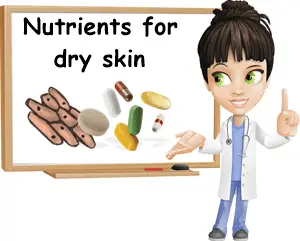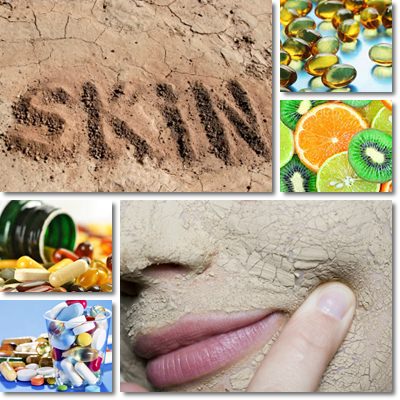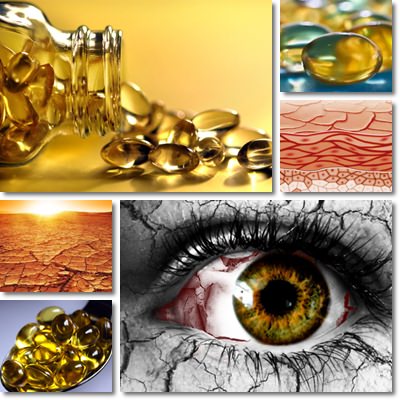Dry skin is known to occur as a result of vitamin and mineral deficiencies. Dry skin caused by vitamin and mineral deficiencies means our skin is basically not getting enough of certain nutrients it requires for preserving a normal degree of moisture.
This may occur as a result of poor eating or increased requirements as a result of stress, disease etc. and it will affect not only skin health and appearance but other areas of our body and aspects of our health as well in time.
There is an incredibly complex relationship between nutrients. Too much of one may decrease the absorption of another, just as too little of one may significantly decrease our body ability to absorb and make proper use of another.
Some nutrients are water-soluble, others are fat-soluble. Some we may need in significantly higher amounts than others. Some accumulate in reserves our body can tap into when needed, others are eliminated as soon as they make their way around our body. And our skin needs quite a lot of them to stay in good health and retain sufficient moisture.

Vitamins and minerals are needed everywhere in our body and depend on one another greatly. Most of them work together with others to accomplish various functions.
On average, we need about 13 vitamins and 13 dietary minerals to be in good health (as well as essential and non-essential fatty acids and a variety of other types of nutrients and elements with nutritional value).
But out of all the essential and non-essential nutrients, the following are the best for dry skin:
1) Vitamins for dry skin: A, B2, C, D, E.
2) Minerals for dry skin: iodine, potassium, sodium, zinc.
3) Essential fatty acids: Omega-3 (alpha-linoleic acid, docosahexaenoic acid, eicosapentaenoic acid) and Omega-6 (linoleic acid).
Remember, this does not mean our skin doesn’t need all the other nutrients too; it just means that we need to make sure we are getting enough of those listed above if we are experiencing excessively dry skin and want to improve symptoms, skin aspect and overall health.
Chances are, having an abnormally dry skin can be caused by a nutritional deficiency; it’s not unlikely for excessively dry skin to be a symptom of a vitamin or mineral deficiency, aside from other common causes.
Just as important, recovering from dry skin is a lengthy process and requires caring for skin both from the inside, with a good diet and, why not, smart supplementing, and from the outside, with the help of various masks, treatments and other remedies for dry skin.

Dry skin nutrition
1) Vitamin A
The outermost layer of the skin is the stratum corneum and is made largely of keranocytes, a type of cell that produces the protein keratin. Accumulation of keratin forms a sort of barrier at the surface of the skin with the role of protection. This barrier-layer, the stratum corneum, prevents water from underlying skin tissue to evaporate and may even absorb water when needed, contributing to an optimal level of hydration of the skin.
Vitamin A regulates skin cell turnover, the rate at which skin cells renew themselves, helping renew the stratum corneum and shed worn out cells.
Low levels of vitamin A may lengthen the skin renewal process and, as a result, the old skin cells at the surface become even more worn out as a result of pressure (touching, rubbing, impact, grasping objects) which may affect their ability to retain moisture in the skin.
Moreover, vitamin A is responsible for what is known as epidermal differentiation, a process in which newly formed skin cells take on different functions.
Without vitamin A, the keranocytes which protect the surface of the skin might produce too much keratin and cause the skin to take on a dry, rough, thickened, scaly appearance.
Moreover, a shortage of vitamin A makes skin susceptible to damage and potential infections, resulting in dry, itchy skin, redness and other symptoms of infection.
2) Vitamin E
A fat-soluble nutrient, vitamin E is found in food sources with a lot of fat which ensure its absorption. Having a sufficient intake helps our skin cells retain moisture, contributing to a better hydrated, softer healthier skin.
In addition to this, vitamin E is an excellent natural emollient, meaning it helps moisturize skin, further reducing dryness and improving its feel. Its antioxidant properties give it anti-aging benefits. Common sources include sunflower seeds and sunflower oil, wheat germ oil and other oils, almonds and nuts and seeds in general, egg yolks, liver, butter.
3) Vitamin C
According to research, vitamin C deficiency significantly decreases the production of collagen, a protein responsible for maintaining tissue structure, skin included. Along with a serious drop in collagen comes the thickening of the outermost layer of the epidermis, the stratum corneum, potentially preventing it from absorbing water to balance skin hydration levels.
Low levels of vitamin C and collagen delay wound healing and the longer wounds take to heal, the more likely it is for our skin to lose moisture and become dry. Some studies suggest that vitamin C may help in the synthesis of fats that help skin preserve its moisture content and reduce water loss through the epidermis.
4) Vitamin B2
Vitamin B2 (riboflavin) is a water-soluble nutrient. A deficiency is characterized by inflammation at the level of the skin and encourages the development of various skin disorders, among other symptoms.
Cracks around the corners of the mouth, cracked lips and dry, cracked skin in various parts of the body are common. Having a sufficient intake of vitamin B2 regulates mucus secretion at the level of the skin and other mucous membranes, benefiting those suffering from dryness.
5) Vitamin D
Research shows people with eczema, atopic dermatitis and other skin conditions also suffer from a shortage of vitamin D. Increasing intake to remedy the deficiency has been shown to greatly improve symptoms such as dry, itchy skin, rough, scaly skin, sensitive or raw skin as well as other symptoms. Our skin and our immune system have receptors for vitamin D.
The nutrient binds to these receptors and helps produce antimicrobial and anti-inflammatory proteins to reduce dry skin and other symptoms of various skin conditions.
Also, research suggests that topical application of vitamin D3 can help improve the level of hydration of the stratum corneum, the outermost layer of the skin, the one responsible for keeping moisture in.

6) Iodine
Iodine is an essential nutrient crucial for thyroid health. Low levels of iodine cause hypothyroidism, a condition in which the thyroid gland produces insufficient thyroid hormone. And a symptom of an underactive thyroid and iodine deficiency is dry skin. If deficient, increasing our intake until individual requirements are met can reverse symptoms.
7) Zinc
An essential dietary mineral, zinc is primarily involved in maintaining a good immunity. But our skin is an element of the immune system too, being the barrier that holds off bacteria. Through its antimicrobial and immune-modulating properties, zinc helps activate anti-inflammatory and antibacterial elements that contribute to treating various skin conditions characterized by itching, redness, soreness and dry skin.
8) Potassium
As an electrolyte, potassium helps maintain a certain balance of fluids in the body. This very principle is what helps it regulate blood pressure, preventing it from becoming too high. By balancing fluids, potassium contributes to ensuring our body has enough water for every process it carries out.
This means that drinking enough liquids and having a sufficient intake of potassium can help us achieve an optimum level of hydration overall, skin hydration included.
A low intake of potassium means that even if we do drink sufficient liquids, our body might eliminate or hold onto too much, resulting in either dehydration (dry skin, dry lips and mouth etc.) or water retention.
9) Sodium
Despite being urged to limit our salt intake as much as possible, we still need it to live and be healthy. Moderate amounts of sodium in our diet help our body retain liquids which it can then use to raise blood pressure to normal levels, hydrate the skin etc.
10) Essential fatty acids (example: vitamin F, Omega-3, Omega-6)
Lipids (fats) help our skin cells retain moisture and maintain an optimal level of hydration. There are two essential fatty acids we can’t function without: Omega-3 (with its three forms, ALA, EPA and DHA) and Omega-6 fatty acids (linoleic acid).
These fatty acids are crucial for cardiovascular health, brain function or overall nervous system health, but also contribute immensely to maintaining skin hydration and reversing dry skin.
Essential fatty acids nourish dry skin both from the inside and from the outside. When consumed as part of a balanced, varied diet, they work towards maintaining moisture in the skin.
When applied topically, they smooth out skin and create a protective fatty barrier that soothes dry, irritated skin and helps it recover and regain its moisture-preserving properties.
Virtually any cold-pressed oil with a high content of Omega-3 and Omega-6 fatty acids can exert therapeutic properties and be employed as a natural dry skin treatment.
